B.R. Sanders's Blog, page 42
August 5, 2013
Writing in seclusion
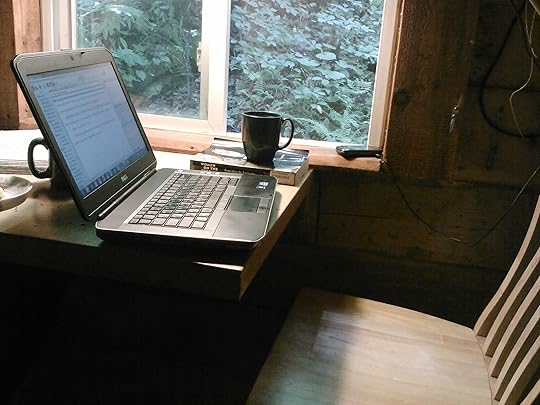
a rustic tea-fueled two-person writing retreat
I’m on vacation right now, which I very much needed. I am on vacation visiting a friend whose taste in books is very nearly completely compatible with mine, and who is as much of an introvert as me. Being with her is sublimely restful. She had been considering a trip to a remote cabin in the woods, and I sort of gently invited myself along, which (it turned out) she was sort of hoping I would do. So, I flew out to Chicago, and we rented a little red car, and I drove us to the Wisconsin woods next to the Mississippi River. The cabin was twenty miles away from any cell phone reception and had electricity adequate to power my laptop but no distracting internet connection. We returned to civilization yesterday and are now in a re-entry to society day where we’re pleasantly sitting in her apartment with her cat and watching Foyle’s War and eating oreos. Tomorrow I return to Denver and my family and my job, and I’ll return restored and replenished and feeling more like myself than I have in weeks.
We didn’t do much in the cabin. We sat around drinking coffee and tea with vegan marshmallows in our hot, caffeinated beverages and talked a lot about feelings and parenthood and Supreme Court decisions and The Iliad. At one point we ventured outside to meander up a dry creek bed, but we were both stoned and neither of us navigated the rocks there with any sort of competence, so our excursion was short-lived. Really nothing happened but the tea drinking and the talking and reading and watching fireflies and some writing, but that was perfect, and the Wisconsin woods was a prefect place to be doing that particular kind of nothing.
And the writing–travelling, for some reason, brings a focus to me and makes it extremely easy to write. I rarely find it difficult to write, but there’s something about the solitude of travelling alone and the distance from the every day grind that lets my mind drift into that little writing pocket with virtually no effort. I wrote 2,349 words on the plane on the way to Chicago. I wrote another 8,772 words in the cabin itself. It was effortless writing, and it was an ideal time for some effortless writing because I managed to establish the voices of my POV characters. My friend doesn’t read my writing. She’s generally interested and we talk about writing in the abstract, and we read the same books at the same time(ish) quite frequently, but I’ve never asked her to read anything of mine and she’s never asked to read anything of mine. I think it was better this way. There are times I very much want someone around invested in what I’m writing, pushing me to get it out, wanting to consume it as much as I want to create it. And there are times I want to create things in a private, hidden bubble. I think the lack of expectation involved in writing around a friend who is not a fan of mine helped the writing.
All of this is to say that the writing for A TALE OF REBELLION is clipping along.


July 30, 2013
Writing Snippet: A TALE OF REBELLION
Idle hands while I wait for a response from the editors on RESISTANCE means I’m working again on the rewrites of THE LONG ROAD, which I’ve tentatively retitled A TALE OF REBELLION. Here’s a snippet of something I wrote yesterday:
Vath worked the compound’s washing with a young woman named Siddah. She was small and wiry, free with smiles, curious and uncomplicated. She was, like every other red elf but Vathorem, a compulsive talker, and she kept up a steady and largely one-sided conversation as they worked. “I’ve never been nowhere but the valley,” she said. “Bardonner born and raised. A body forgets there’s a world out there beyond the peaks. You all, you must be from all over.”
“From here and there,” Vath said.
Siddah grinned at him. She bestowed these pleased, delighted grins on him when he spoke. She had a giddy, contagious enthusiasm, and he found that since she weren’t asking anything of him, since she weren’t trying to suss him out, since she seemed simply pleased to have his company, that he didn’t mind her chatter. It was a lovely change of pace for him, to be stuck with someone happy and untroubled, someone who had, perhaps, never known panic. She kept on. “Where are you lot from? Rethnali, I didn’t know her or nothing. I’m young, right. I know she’s from here, but I didn’t know her myself. But the rest of you, you all must be from all over! From the flatlands. From the cities! And you all found each other in the forest and stuck together. Like a song, it it. Sort of…romantic. You think?”
“Far less romance than you’d guess,” Vath said. And then he remembered the way Fenner was forever trailing after Rethnali, and the way Sellior was forever pining over Fenner, and he laughed. “Well, there’s a bit of romance to it, I guess.”
Siddah dropped her washing in the tub of soapy water. She leaned across it, conspiratorial and curious. “Oooh, is it that tall one with the pale hair and that boy in mourning? Is that the romance?”
“Par and Selli? No. It’ll be some time before Par’s going down that road. Deep in mourning, that one. Lost his girl and he’s drowning in guilt.”
“That’s sad,” Siddah said. She plucked the sheet out of the tub and clucked her tongue.
“Mostly it’s sad stories, what we have, and not romantic ones,” Vath said.
“But you all, you’re heroes!” Siddah said. “Everyone round here says so.”
“If you really listen to heroes’ tales,” Vath said, “you’ll find they’re riddled through with a wicked sadness, each and every one.”
The girl frowned. She beat the sheets against a boulder. Vath could feel brewing in her a disquiet. She stopped and wiped the sweat from her brow with the back of her arm. “If it’s all such wicked sadness,” she asked, “then what’s the point of fighting?”
Vath laughed.
Siddah looked over at him and smiled. “You laughing at me, soldier?”
“No, girl,” said Vath. “I’m laughing at me.”
“You didn’t answer my question,” she said.
“There’s no answer to it. Or there’s a thousand answers to it, and not a one is satisfactory.” Vath sat on the rocky ground and cracked his knuckles. “The reasons we started fighting aren’t the reasons we’re still at it. Some of us ain’t got nothing but fight left in us. Some of us don’t know nothing but the fight.”


July 24, 2013
More Processing on the Writing Process
I submitted RESISTANCE to the press last Sunday, and now I’m in the waiting-for-feedback limbo. I’m still very much in the process headspace, and I just finished re-reading all the Harry Potter books and having all the resulting Harry Potter feelings, so it was time to grab something new to read off the shelf. I grabbed this:
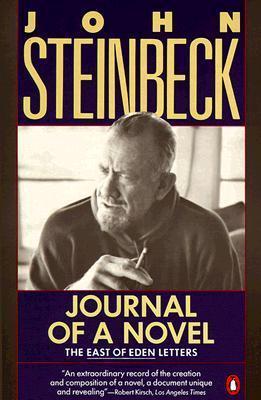
really this should be titled WATCH STEINBECK WRITE LIKE A BOSS
I didn’t really think too much about it, just shoved it in my backpack. And then I marveled at the fact that my backpack was at least 5 pounds lighter than it had been in two months since I was no longer hauling around a Harry Potter tome, but that’s neither here nor there. I grabbed it, and then I cracked it open on a bus and realized I was reading, largely in real time, a (much greater) author’s own process-y headspace while he wrote EAST OF EDEN. Apparently I am still very much in dialogue with myself about the writing process, and now I am in a one-sided dialogue with John Steinbeck, too. This volume is a collection of letters he wrote but did not send to his editor, Pascal Covici, while he wrote the first draft of EAST OF EDEN. The letter served as a warm-up exercise for him, something to get him in the groove of the day’s authorial work, and as such they flit from the gritty mundanities of smudged graphite to his ultimate sweeping purpose for his novel from paragraph to paragraph. The style is casual and unguarded, which makes sense given that he never expected anyone to read these letters, and it serves as a friendly work diary.
There are weird familiarities in terms of process as I read Steinbeck’s work diary. He talks of his book “having pups” and getting longer and longer, breeding side-stories and subplots. And, man, do I ever know that feeling. My books are all so interconnected that I sometimes feeling like I’m writing fanfiction about my own stuff. RESISTANCE, or rather its base story, “Proof”, came about because one of the leads was mentioned in “Blue Flowers” and the other lead down the line has certain interactions with some characters in THE LONG ROAD. This whole project began, essentially, as a way of filling in some backstory for other projects. Every minor character is a hero in her own story, and I have a very strong tendency to let every minor character take center stage at some point.
Steinbeck is also a much more deliberate writer than I am in terms of structure. This could be simply an individual difference, but it could also be that EAST OF EDEN was written late in Steinbeck’s career, written when he had done most of his learning and stumbling, while I’m still just crawling through. He had very particular ideas of what a chapter is or should be. He had very particular ideas about how chapters should relate to and balance each other. He came into the book very much knowing how he wanted it to be read–not necessarily what he wanted to say, but how he wanted the reader to feel, what the experience of reading it should be like. He spends much more time in his unsent letters discussing pace, discussing the need to keep himself relaxed in order to keep the text itself relaxed, than he does on plot or character development. Again, maybe this is a sign of my youth as a writer, but I haven’t yet started a project with an intent to readership experience like that. I don’t know that I can just yet.
Now, I really like RESISTANCE. I think it’s awesome. It’s no EAST of EDEN, though; that shit was a masterpiece. The biggest, strangest and most obvious revelation I’ve had reading his letters is that the work one writer is the work of all writers. Steinbeck wrote long hand with pencils–he was very, very particular about his pencils, actually and spends much time outlining his pencil preferences in these unsent letters to his editor–and I wrote RESISTANCE on a laptop. He wrote EAST OF EDEN at home at a very particular writing desk of his own design, which he fiddled with and perfected over the course of the novel, and I wrote RESISTANCE mostly on buses and airplanes. The methods are different, but his process and mine and probably everyone else’s is essentially the same: you just…write it. You just write a chunk (mostly) every day until the beast is done. Or, in Mr. Steinbeck’s own words right as he began:
I don’t suppose writing consists in anything more than doing it.
And so we do it. And sometimes we finish what we start, and sometimes we edit it, and sometimes it sees the light of day. And sometimes–so very rarely, but sometimes–someone writes and finishes and edits something that turns out to be something like EAST OF fucking EDEN.


July 20, 2013
Correcting RESISTANCE
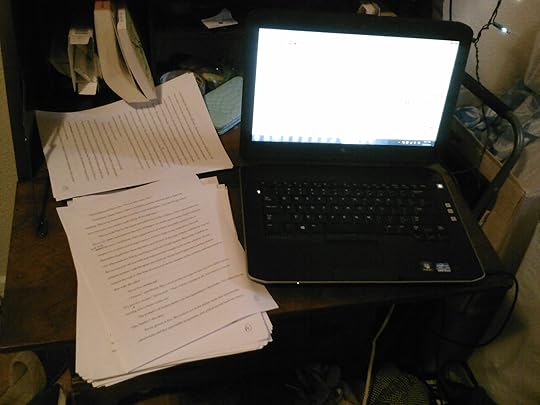
ah, the glamorous life of a writer
I’ve gotten feedback from some wonderful and thoughtful beta readers. I printed out draft 1 of RESISTANCE and pored over the text myself. All that’s left before I send it to the press is to correct the draft!
I’m doing that over this weekend since working from a sheaf of loose papers and a laptop is not so bus compatible. I’m getting this iteration of the book as close to perfect as I can for the editors–though no matter how many times I go over something or someone else goes over it a fresh set of eyes unearths a new volley of crappy grammar and bad spelling. Pays to be humble, y’all.
I like this part of the process. The hard work of editing is done and all of this is just the icing on the cake. When there’s only 1-5 corrections per printed page you fly through the draft pretty quick, so there’s a happy illusion of productivity.


July 11, 2013
Writing RESISTANCE: A Post-Mortem of the First Draft
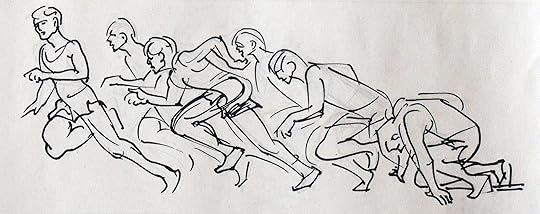
replace this image of someone furiously running with my fingers furiously typing and you get the picture
(image courtesy of Wikimedia Commons)
RESISTANCE is still not done: it’s currently out to a host of wonderful and voracious beta readers, and then the first draft needs a final pass before I send it to Inkstained Succubus. Then, the editors will read it (and hopefully like it!), there will be a developmental edit, rewrites, line-editing, etc. So RESISTANCE is not done. But, the first draft is done! And getting out that first draft means I’ve jumped a pretty huge hurdle already.
Writing the first draft of RESISTANCE was a different process than writing anything else I’ve ever written. Not the content–after all, RESISTANCE is an expansion of my short story “Proof” and is set in fantasy universe I’ve written in many times before. What was different about RESISTANCE is that this was the first piece of fiction I’ve ever written on someone else’s timeline. And it is the first piece of fiction I’ve written with an explicit idea of getting it published. The combination was a doozy, let me tell you.
I confess I had a touch of panic. I had a few moments of imposter syndrome-induced neurosis. Nathan Bransford described J. K. Rowling as a clutch writer. While I was writing this draft of RESISTANCE I felt like anything but a clutch writer. I had a weird blindness: I would write and reread what I’d written and I could not tell if what I’d written was good. It seemed good? Maybe? BUT THIS IS FOR REAL IS THIS REALLY GOOD?? The self-doubt just crept up and lingered around the edges of my brain. Added to this that I rarely write a plot so meticulously planned, which gave me a feeling of being slightly out of my comfort zone, and I very much had no idea if what I was doing was going to fly.
I went with it anyway. I have, more or less, two secret superpowers: 1) I am a fearless public speaker and (more relevant) 2) I am really, really good at buckling down and barreling through a heinous amount of work. The meticulous planning was, in retrospect, a good move on my part–I had no moments of writer’s block. I sprinted to the finish line in a mad dash, because the faster I wrote the more time I’d have to polish this manuscript before sending it to the editors. And now it’s done, and I’ve read it and a couple of other folks have read it, and the early feedback is promising. I am still anxious, definitely I’m still anxious, but the draft is tangible now. At the very least I like it and that’s something. Whether the editors will agree is still an open question, but I like it and that feels pretty great.
I had thought in the planning and the sprinting that the actual writing process itself would be more…stale. I had thought that by planning everything out and writing so fast that I would effectively be choking out that exploratory part of the writing. Turns out I was wrong. Mapping out the plot served to make this a smoother, faster process, to be sure, but the book still evolved organically. Themes fell into place that worked with the plot but which I didn’t see coming. The story twisted and turned in ways that surprised me even though I followed my 14 page outline virtually to the letter. In retrospect, it’s a tiny bit silly that I thought writing RESISTANCE would be a perfunctory thing; the rewrites of ARIAH were no less meticulously planned out and no less surprising to me as I drafted them anyway. I’ve been mired in a lot of first drafts lately, and it could be that I’d forgotten how fresh and exhilarating a from-scratch second draft is.
I am marking this as a success, which means I’ve just edged a little bit further out of my comfort zone as an emerging writer. And really, when you’re a writer at any level, is there anything better than coming out of a project and feeling like you grew in the process?
ETA: Hey this is my 100th blog post! What a cool little coincidence.


July 8, 2013
PROOF Expansion reader for beta readers!
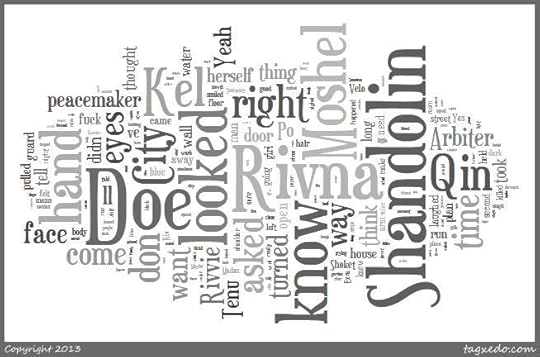
bigger and better than ever
Holy shit, you guys, I finished expanding “Proof” into a novel! I have tentatively retitled it Resistance as adding 45k words does tend to change the scope and focus of the work a little bit. I’m planning on writing up my process and experience working on a deadline, but for now, I’ll just throw out a call for beta readers!
Resistance has many faces, and one of them is Shandolin’s. When she finds her friend brutally murdered, Shandolin knows that her life as an elf living in the City of Mages under the heel of the Qin is going to get a whole lot harder. Though the Qin have her in their sights and put an assassin on her trail, Shandolin decides to fight instead of run–but her only hope of survival is a takeover of the City government.
Shandolin draws everyone she loves into the fray with her: her assassin lover, Rivna, who would prefer a quiet life; her mentor, Moshel, whose history with the Qin leaves him paralyzed and frightened; and her best friend, Kel, who has too many mouths to feed to play a losing game of politics. Apart, they are weak, but together Shandolin and her friends, lovers and fellows may be just strong enough to save their skins and the skins of the other elves in the City.
Set in the unique and finely realized fantasy universe of Aerdh, RESISTANCE is a completed fantasy novel 52,000 words in length. RESISTANCE is about the big and small ways hunted people fight back, and what it may cost them if they win the fight.
Interested? Let me know!
[contact-form]


June 19, 2013
PROOF Expansion Update
I did not mean to neglect this blog so long, but as you are about to see, I have been hella busy. the expansion of “Proof” into a novel is going really well! I am actually ahead of schedule already. Good job, me. Anyway, I thought I would write up a post that walks you through my process for this blitz writing project step by step, because if there’s one thing the aspiring author blogosphere needs it’s another writing process post!
Step 1: Make a plan of attack
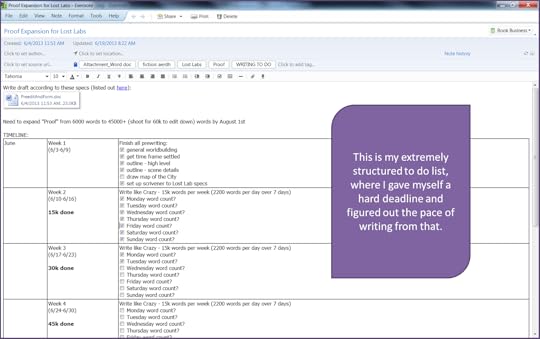
Evernote is awesome because you can stick in to do check boxes, and there’s nothing sweeter than checking off a box. I’M DONE, BRO you say to Evernote. And then Evernote buys you flowers.
I have a hard deadline for this project–August 1st–so it made sense to me to map backward from the hard deadline to see what needed to be done by when. I know my writing process well enough now to know I would need time for worldbuilding/brainstorming, obviously writing time, and then a little cushion at the end for copyediting. Because, you guys, I am a shit typist, and I don’t catch the terrible typing as I’m writing. Since this is my first project I’m doing ~for realsies!~ like with a really good shot at seeing it published I am kind of nervous. Instead of getting stuck in the self-doubting seventh circle of hell, I’ve built in even more cushion time to get a couple of my very fastest beta readers to look through the manuscript before I send it off (though if they’re like WOW B THIS SUCKS MONKEY BALLS I’m not sure there is functionally enough time to really do anything about that; this is mostly a peace-of-mind thing).
I gave myself a week of worlbuilding/planning time at the start, then two weeks at the end for edits. The time in between is writing time, and I worked out how much I would need to write everyday all of those days in order to hit 60k words by the point at which I need to start editing.
Step 2: The outline to end all outlines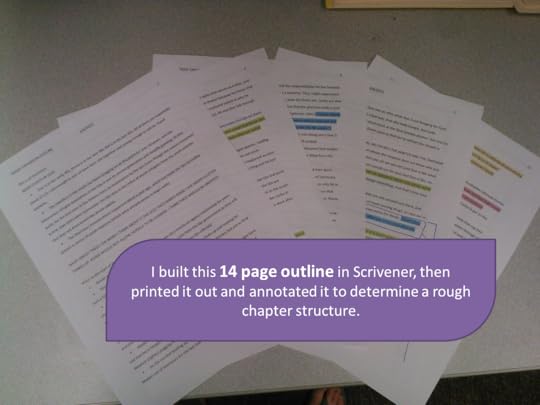
You see the highlighting? The highlighting means I’m taking this seriously.
I mentioned before that I’m not much of a plotter, but for this project plotting makes sense logistically. I’m pretty sure that was exactly the right call to make, so I wrote up a very extensive outline of what is essentially the original short story but with many more complications and a handful of new characters thrown in for flavor.
The thing is, when I say I don’t plot or plan much for most of my work, I mean that pretty much wholesale. I don’t structure the plot ahead of time, and I certainly don’t pay much attention to the structure of the book itself (chapters, sections, etc). But I did this time. I figured give or take 6k words was about the right length for a chapter which in a 60k draft would mean give or take ten chapters, so I printed out the Massive Outline and broke up the action by chapter, and within chapters broke it into scenes.
Step 3: Structuring the draft in Scrivener

Oh, corkboard feature. What a fool I was to think I’d never use you.
Each scene got its own notecard with the following: a chapter designation, a scene number, a quick and dirty summary of the action this scene pushes forward, and keywords describing the characters present, major plot points, and setting.
The fact that you can mouse over the card in the binder and it displays the summary is super useful while writing–essentially, it lets me write to the next scene so I can keep any foreshadowy bits in mind as I go along.
Step 4: Get your write on
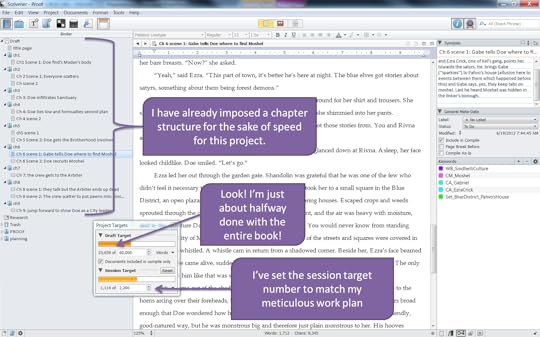
This is the fun part.
I’ve set this hard goal of 2200 words per day every day until the book is done. Now, I work 40+ hours a week and parent a toddler and have, like, a life and shit, so 2200 was, I thought, a reach goal. But it’s working.
I write on the bus, basically exclusively on the bus. I have a 40 minute block in the morning where I’m getting out about 1200 words, and I have another 40 minute block on my way home in the afternoon where I usually match or surpass the amount written that morning. The fact that I know the story so well and have hammered out all the actual stuff that happens makes this a bit easier, but by a week in honestly I think the rhythm of writing in two focused blocks helps me get all those words out.
This is not to say there haven’t been surprises along the way. The chapter structure has shifted a little. Characters I definitely did not expect to show up came into the story. Characters I thought I knew quite well showed me a whole different side to them. Despite all that meticulous planning and the rigidity of my writing schedule, the actual writing part of this project still feels very organic, which I think is a good sign.
Step 5: Progress monitoring is key

And we’re back to my dear old friend Excel which you may have noticed I use for basically everything.
I keep a spreadsheet where I track daily writing, log whether it’s writing or planning or blogging or what, and where I track my queries. I also keep a list of books I’ve read in here. Look, I just like lists, ok? That’s not a crime.
Usually I just have this log because I like data, but for this project it’s vital to track and monitor how closely I’m following that week-by-week project plan I’ve got over in Evernote. Doing this showed me that this weekend HOLY SHIT I was actually far enough ahead of schedule that I could take a break from writing. Which was good because I had Proper Adult Things to do this weekend like cook Father’s Day brunch for my partner and organize the hellhole which was once my closet and play with my kid and install a new saddle on my bike. Also somehow I drank an entire jug of orange juice in a single day. That was super important, and frankly, I feel rather accomplished.
This spreadsheet is actually kind of awesome because I have it where it auto-sums the number of words written within the year to date and also it sums the total number of words in a month and takes the average written daily for the month. WHAT I LIKE DATA.
Step 6: Make sure your ducks are in a row
[image error]
Compiling sounds so productive, doesn’t it? “Oh, what did you do today?” “I compiled an entire book!” “Wow, look at you go!”
I am writing the book according to the specs I’ve set the Scrivener editor to for my own particular preference (12 pt Palatino Linotype, 1.5 spacing in case you’re interested), but lo! The press for whom I’m writing the book has preferences of their own. The mysteries of the human mind. Anyway, they send me a pre-edit checklist and formatting document, and I spent an hour or so tinkering around in Scrivener’s compile settings to work out how best to get Scrivener to export exactly the kind of document they want. I periodically compile a chapter here or there to make sure everything fits their requirements, and then I can just write the damn book without having to scramble at the end to make the formatting work.
So, that’s where I am and what I’ve been doing the last couple of weeks! It’s clipping along at a great place, the nerves about this REALLY BEING A REAL THING are manageable, and I’ve been able to keep my head above water in the other domains of my life. Basically, I feel like this guy:

Well, I feel like this guy if he was, like, wearing clothes.
(image courtesy of Wikimedia Commons)


May 30, 2013
Expanding PROOF – Week 1
As I mentioned a few days ago, I have switched gears to due an impending and enormously exciting deadline! Since I document everything ever, I figured I’d go ahead and document this process, too.
The gist is in two months I need to take “Proof”, a 6,000 word short story, and expand it into a short novel by adding at least 40,000 words. No small feat, right? Well, luckily, I have a bit of a head start: “Proof”, like the vast majority of my fiction, takes place in Aerdh. And it explores characters in a locale i’ve pretty thoroughly built out worldbuilding-wise. And it dovetails with some characters I’ve written about elsewhere. In short, I have a pretty comprehensive sense of what’s going on in the universe in which the story is set at that particular time in the universe’s history, which makes things a lot easier to work with. Mostly expanding “Proof” means taking the current plot, which is stripped pretty bare, and throwing in a bunch of complications to blow up the scope of the narrative.
I’m pretty sure I’ve mentioned this before, but I’m not much of a plotter. The pace and action of my narratives typically develop organically from exercises in worldbuilding first and then character development. This project is really no different–the characters are definitely my starting place.
[image error]
“where should i start? I know! A nice orderly table about my characters”
“Proof”, at its heart, is a love story, and I very much want to keep that element when I expand it to a novel. Specifically, “Proof” describes a relationship between two women that already has a history. Obviously, one direction I could take the project in is to pull back and watch them fall in love. But I like that they’re already together, that they already have a rhythm and a history. My inclination now is to keep it like that and to use the longer format to explore why and how they work (and why and how they don’t work) together. There is a certain kind of playfulness that exists when you’re writing about two people who already know each other and already love each other that is a little different than the sort of playfulness that exists when a relationship is new and still forming. I want the book to be about how they stay in love rather than how they fall in love.
So, since this will be a book so deeply rooted in how these two characters play off of each other, I started with mapping out how they react to each other. With a table. Look, I’m an analyst by training and trade, right, I think in tables.
The other thing I’ve been working on is an extremely rough idea of a plot. Now, the reason I’m doing this instead of just letting it blossom on its own like I usually do is a matter of scope–left to my own devices I will turn this into a 200,000 word epic about the nature of love and loss and shit like that. And it would be good. But this needs to be a quick, swift romp with just enough gravitas, and for that I need to keep my focus. Since I’ve got two months to make it happen, I don’t have time for a sprawling first draft.

EYES ON THE PRIZE, SANDERS
So I’m brainstorming at lightspeed, figuring out which elements of the current story need elaboration and what the scope of this will be. It’s like a planning blitz, and so far it’s been really useful. I am sort of concurrently working out the roughest outline in the whole wide world.
I’ll keep y’all posted on where it goes from here!


May 27, 2013
When and Where I Write

spoiler: it’s on the bus
(image courtesy of RTD; click through for source)
I am pretty prolific writer, the kind that finishes multiple novel-length projects per year, but I can only write under certain conditions. Mostly, I just need to focus. I have an extraordinary ability to focus–it doesn’t need to be quiet, I don’t need an empty room, I just need people not to be actively demanding my attention. That’s it. And that’s pretty simple, but the thing is, it’s basically impossible for me to write at home.
I have an hour long commute into and out of work, and I work all day at my day job. I love my family, and I want to see them. They’re my family! They’re great. And they want my attention the second I walk through the door, and I want to give it to them. I’ve tried to write at home, but it’s just not going to happen when my two year old pats the back of my laptop and says, “close it, close it!” She’s only going to be two once; I can’t spend her childhood trapped behind a screen.
I was writing at work, but work has been hectic lately. It’s been like a sprint to quitting time every day the last month or so, which means there hasn’t been any extra downtime to write. Now, I don’t go out much. I don’t do much aside from a) hang with the family, b) go to work and then do work there or c) travel to and from work. My commute to work involves a 45 minute bus ride each way, which means:
I have been writing mostly on the bus. I write hunched up in uncomfortable seats with my too-big government issue work laptop. I write in the stop-start-stop-start lurch that makes a bus ride a bus ride, and I type away while tired, dusty construction workers glance at what I’m working on from the corner of my eye. The bus ride is a twice-daily period where I am crammed in close proximity to 50 strangers, and it’s also paradoxically the twice-daily period that counts as my alone time. It is loud, and it is hot, and it is smelly and I have no elbow room, but the bus is where I get my writing done. I am able to tune the bus and the people on it out and hack away at my fiction. When you’ve got a day job and two partners and a toddler, 45 solid minutes with only the most minimal obligations to those around you is a gift.


May 25, 2013
Shifting Gears

we pause our regularly scheduled shit for an exciting new project now on an exciting new deadline
(image courtesy of wikimedia commons; click through for source)
I had a Back to the Drawing Board post all half-written, but it’s going to have to wait. Not that I haven’t made progress on The Long Road rewrites, because I have*, but because it can be put on hold and something else has to get done by August 1st.
I submitted “Proof” to an open call for an anthology, and it caught the interest of the editors! Alas, it doesn’t look like the anthology is happening, but they have expressed interest in me expanding “Proof” into a short novel! They want the daft by August 1st, and I have full confidence I’ll make that deadline.
*Actually, I made quite a bit of progress The Long Road. I started drafting the rewrite! I am about 5k words in. Yep, the second I finished with all that prewriting and worldbarfing and timelining I have to put the project on hold.





